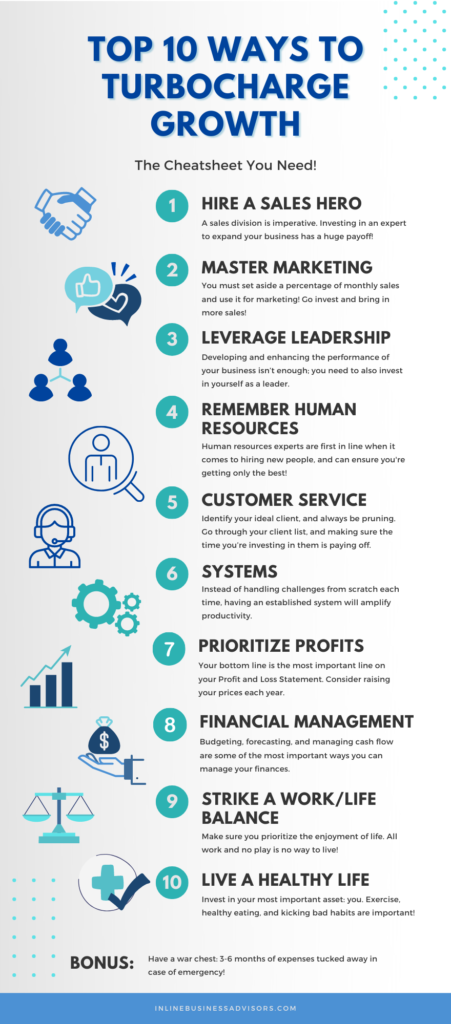The importance of leadership development in business cannot be overstated. Some would argue it is even more important than any other investment a company might make. As the adage goes, “A fish rots from the head down.” This saying often illustrates how bad decisions at the top of an organization can cause problems throughout the company.
Strong leaders set the organization’s vision and direction, inspire and motivate employees, and promote innovation. They also play a crucial role in decision-making, problem-solving, and conflict resolution in the workplace.
In other words, leaders are the backbone of every organization; without them, companies would not be able to function properly. From big corporations like Google to small businesses such as restaurants, organizations must invest in developing their current leaders and identifying new talent within the company.
Let’s explore leadership development, why it is essential, and how to develop effective leaders in your business.
What Is Leadership Development in Business?
Leadership development has been defined as the process of identifying and grooming future leaders in an organization. It can also refer to the development of leadership skills within current company employees, often focusing on how they can contribute more effectively to their team and/or larger organization.
The Center for Creative Leadership handbook of leadership development defines leadership development as the process of “expanding the collective capacity of organizational members to engage effectively in leadership roles and processes.”
The emphasis here is on improving team building and organizational development, not just making one person a better leader. The guide mentioned above explains that leadership processes aim to enable groups of people to work together in meaningful ways in roles that come with or without formal authority.
Leadership development can take various forms, including formalized training programs and informal mentoring sessions.
Tip: Applying effective leadership development tactics for your business can increase your productivity. See this guide for leadership development programs and strategies you can use.

Why Is Leadership Development in Business Important?
Earlier in this article, we stated some examples of what strong leadership offers a company. As a business owner and team leader, your team looks up to you for guidance on how to best execute the company’s vision.
However, you are not omnipresent. No matter how hard-working you are, you simply can’t be everywhere. That means you’ll sometimes have to delegate duties and will definitely need a competent person to handle sensitive and vital tasks. The same is true for managers and supervisors in the company. A company that invests in leadership development has no issues on this front.
The benefits of good leadership development in business are innumerable: increased profits, increased employee satisfaction and retention rates, more efficient processes within departments, improved morale across all levels, and more engaged staff members.
Other benefits include developing succession plans to ensure continuity if a key leader leaves or retires and increasing success in navigating change.
It Increases a Company’s Profits
Leaders, good and bad, affect a company’s financial bottom line, according to this Forbes article. After studying 50,000 leaders, the researchers found compelling evidence to prove that “Poor leaders lost money, good leaders made a profit, and extraordinary leaders more than doubled the company’s profits in comparison to the other 90%!” So yes, leadership building is an essential element in financial management.
Leadership affects a company’s profitability depending on how successful it is in several key areas. These include alignment at the top, connection to the mission, culture, engagement, and customer retention.
Here are some statistics that make a strong case for investing in leadership development:
- Productivity increases by 50% when employees move from an average boss to a high-quality boss
- Better leaders can improve customer satisfaction by 4%, and that results in over a 2% increase in revenue growth
- Firms with high levels of employee engagement report 22% higher productivity
- Engaged employees are 38% more likely to have above-average productivity.
It helps Improve Organizational Efficiency
For many companies, there’s an internal struggle between profitability and growth on the one hand and operational efficiency on the other. You may have heard it said that the engine that makes it all work in a successful company is its employees.
The truth is that you need people who know how to get things done and who are happy doing them. People are likely to be disengaged from their work if they aren’t placed where their skill sets best fit. This means your company won’t run optimally.
In times of crisis, continuous leadership development can help you make changes before your company collapses. It also helps improve the skills of current leaders, making them more effective and efficient.
Periodic reviews of employees’ output, their ability to get along with others, and additional skills outside their resumes can help you maximize an employee’s talent. Conversely, you will miss out on the amazing things your employees can do if you don’t perform leadership development!
Facilitates the Development of Succession Plans
Let’s face it, employee turnover is inevitable. People choose to leave a company for different reasons, and sometimes there’s nothing you can do or say to change their minds. So where will that leave you when that happens?
It may seem like common sense, but many companies don’t realize the importance of leadership development until they find themselves struggling with filling positions. Events such as retirements or terminations have serious implications if not adequately mitigated and can negatively impact your company’s success.
Organizations need to develop their leaders from within to have a continuous pipeline of qualified candidates ready when needed. This allows a company to cultivate potential leaders in their ranks and may even minimize the hiring costs required to fill higher-level positions when they become available.
Enables a Company to Attract and Retain Top Talent
Following the great resignation after the pandemic, companies are jostling with each other to win the talent war. From attractive employee benefits packages to flexible work schedules, organizations are doing all they can to make their companies more attractive to top talent.
Your company’s leadership can make all the difference for you. A recent study by the SHRM (Society for Human Resource Management) proves the old adage: employees leave bad managers, not companies. The research further found that:
- 84% of employees cite bad managers as a major source of stress
- 57% of employees believe their managers need more training to become better leaders
This study by the Pew Research Center supports that:
- 63% of employees who quit their job last year did so because they felt there were no opportunities for advancement
- 57% left because they felt disrespected at work
Millennials are not the only generation feeling the pressures of today’s economy. It is crucial for all generations to find a company they can grow with and feel valued in. Strong leadership is vital to employee attraction and retention because it can create a meaningful work culture.
It Increases Success in Navigating Change
Workplace dynamics are changing rapidly, and there is no indication that this will slow down. With these changes come new challenges for leaders to address, from an increasingly diverse workforce with different values and needs to a constantly evolving global economy.
Businesses must be flexible, agile, responsive, resourceful, collaborative, and adaptive to keep up with a fast-paced world constantly in flux. The key question becomes: how do you prepare your team to navigate these challenges?
In a world of constant change, leadership skills are crucial to both companies and employees. Without leadership development, individuals will struggle with their professional lives as they lack confidence in making decisions or navigating challenging situations.
A leadership development program will help equip your team with the skills they need to survive and enable them to develop their own leadership style as needed for their individual roles or teamwork.

Leadership Skills Your Business Team Needs
Your team’s leadership skills may depend on their size and the type of work they do but typically include clear and effective communication, emotional intelligence, ability to delegate, and problem-solving. Other essential leadership skills include leading by example and creating a cohesive culture.
- Clear and effective communication helps eliminate confusion and ensures every team member is aligned with your organizational goals. It also allows leaders to understand their employees and develop mutually beneficial relationships.
- Emotional intelligence is a powerful attribute of a great leader. Emotionally intelligent leaders can manage their emotions and those of others well, are self-aware, and can empathize with others.
- The ability to delegate ensures leaders do not negatively impact their employees’ productivity by micromanaging and suffocating them. Leaders with this quality know how to identify, nurture, and empower their employees for better and bigger roles.
- Problem-solving skills enable a leader to overcome potential challenges and design an effective response despite any time or budgetary constraints.
- Excellent leaders lead by example and set the tone for other team members. They are instrumental in creating a cohesive culture and boosting employee morale.
How to Develop Leaders in Your Business
It is important to note that outstanding job skills do not necessarily indicate leadership ability.
Only 33% of great leaders are born with the innate ability to excel in leadership roles. The rest become great leaders through a process of acquiring complex skills through life experiences, self-development, and access to subsequent training.
As a business owner or CEO, you have the power to call out the leader in the two-thirds of employees who aren’t “natural leaders” in different ways. Common methods of developing leaders include:
- Coaching
- Training programs
- Mentorship opportunities
- Leadership development workshops
Here are several things you can do to develop better leaders in your business:
Recognize and Develop High-Potential Employees
Everyone on your team has different strengths, weaknesses, skills, desires, and aspirations that need attention before reaching their full potential. It’s crucial to consider each individual’s personal interests and goals, ambition, drive, motivation, and vision when designing a leadership development program.
Why does that matter? It matters because not everyone is ready to take the leadership mantle. While it’s true that the top performers in various departments may indeed become great leaders, that is not always the case. Recognizing other high-potential employees can help you make better choices and pass on the baton to a better-suited candidate when the time comes.
Start Leadership Development From the Start
Don’t wait until there’s a vacancy to fill to start developing leaders. If possible, leadership development should begin during the hiring and onboarding stage. The key is to look for candidates with qualities that make them good future leaders.
Some examples of these qualities are the ability to build relationships, problem-solving skills, intellectual curiosity, collaborative style, and ability to balance head and heart when making decisions or solving problems.
Research shows that it can increase employees’ engagement with their work and reduce turnovers. Employees are likely to stick around if they feel their organization has growth opportunities.
Share Your Company’s Vision and Strategic Direction
Sell your vision regularly, and ask your team to provide honest feedback if you want them to trust you. This will help them understand what they are working toward and give them context for the decisions they need to make on a day-to-day basis.
Remember, people will often put their best foot forward if they feel they are part of the process and their opinion matters. Your goal should be to help everyone you work with understand what you are trying to accomplish and inspire them to do their best work.
As soon as you hire someone new, share this information with them. Additionally, provide regular feedback on performance to help employees feel like they’re part of a collaborative effort that supports personal growth.
Provide Opportunities for Leadership Development
Do not reserve leadership development opportunities only for the top brass.
The most crucial aspect of any leadership development program is the individualized approach. Every person is unique and needs different kinds of guidance to become a better leader.
Some suggestions include formal programs like coaching, mentoring, and on-the-job training, and informal programs like social events, retreats, or lunch with key people. All employees should have an opportunity to grow their skills through these different types of opportunities to become more confident and productive in their roles.
Wrap Up
Leadership development is crucial if you’re looking to take your business to the next level. As we’ve already established, the ability to effectively lead a team can make or break a company. Providing resources and support to leaders in your organization can make them more effective now and in the future.
Check out our guide here if you want to learn more about how you can grow your business through leadership, sales, and marketing.

Larry Vivola is a successful business coach who coaches entrepreneurs anywhere in the world via Zoom. If he’s not coaching he’s making meatballs and entertaining friends and family!
Free Advice Sucks! Invest in a one-time strategy session and pick Larry’s brain to help solve a pressing problem, discuss an idea, or brainstorm how to give your business performance a Turbo Boost!!! In the end your investment will yield you more money, time, and happiness!

